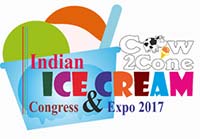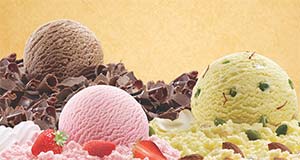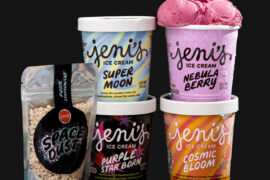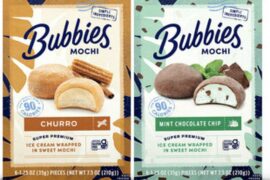How sweet it is! The ice cream business in India is one of the fastest expanding segments in the nation’s food processing industry, jumping from Rs 9,000 crore in value last year to Rs 12,000 crore in 2017, according to Sudhir Shah, secretary of the Indian Ice Cream Manufacturers’ Association (IICMA).
Meanwhile, there’s plenty of room for further expansion on the horizon.
“While the ice cream industry is growing at the rate of 15-20% year-on-year, per capita consumption in India is a paltry 450ml, vis-à-vis the corresponding amounts consumed in the United States (22,000ml) and China (3,000ml),” said Shah. “With the improving cold chain infrastructure in the country, coupled with the increasing disposable incomes and the changing lifestyles, the sector has great potential for growth.”
 Shah, who is also managing director of Esamia Bazar, Koti, Hyderabad-headquartered Scoops Ice Cream, made the remarks during the Indian Ice Cream Congress and Expo (IICE), which took place in Mumbai on September 15 and 16. Hundreds of manufacturers as well as suppliers of ingredients, equipment and packaging attended the event, which featured approximately 150 exhibiting companies and attracted about 5,500 visitors from throughout the country and abroad.
Shah, who is also managing director of Esamia Bazar, Koti, Hyderabad-headquartered Scoops Ice Cream, made the remarks during the Indian Ice Cream Congress and Expo (IICE), which took place in Mumbai on September 15 and 16. Hundreds of manufacturers as well as suppliers of ingredients, equipment and packaging attended the event, which featured approximately 150 exhibiting companies and attracted about 5,500 visitors from throughout the country and abroad.
The proliferation of ice cream parlors and scoop shops was cited as an important factor for increased consumption and today’s healthy business climate.
 “They become the focal points, as ice cream lovers associate with several popular brands through them. The mushrooming of parlors everywhere in the country defines the growth of ice cream players, as they gain a wider reach and target audience,” said Shah.
“They become the focal points, as ice cream lovers associate with several popular brands through them. The mushrooming of parlors everywhere in the country defines the growth of ice cream players, as they gain a wider reach and target audience,” said Shah.
The scope of impact that ice cream parlors are having on sales was underscored by Shrinivas Kamath, director Mumbai-based Kamath Ourtimes Ice Cream Pvt Ltd, who remarked: “For any ice cream manufacturers, parlors are a very important attribute of the supply chain. Ninety-eight per cent of our business comes from parlors.”
 Along with discussing positive trends, there was also concern expressed about the rising cost of doing business in general and higher taxes in particular during the congress and exposition.
Along with discussing positive trends, there was also concern expressed about the rising cost of doing business in general and higher taxes in particular during the congress and exposition.
“Ice cream is no more considered as a seasonal or luxurious product, because consumers have made it an impulsive dessert, and hence, the ice cream industry was surprised when the GST (Goods and Services Tax) Council placed the product in the 18% tax slab. This high rate is likely to have an impact on the industry, because we were anticipating a 5% GST rate,” said Ashish Nahar, an IICMA managing committee member and owner Nahar Frozen Foods and Ice Cream Pvt Ltd.





